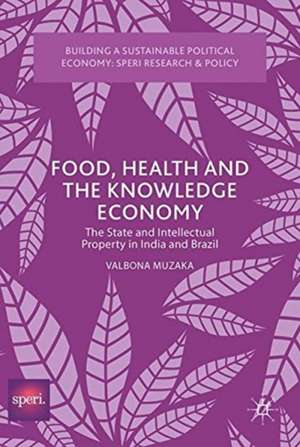Food, Health and the Knowledge Economy: The State and Intellectual Property in India and Brazil: Building a Sustainable Political Economy: SPERI Research & Policy
Autor Valbona Muzakaen Limba Engleză Paperback – 13 noi 2020
| Toate formatele și edițiile | Preț | Express |
|---|---|---|
| Paperback (1) | 415.85 lei 38-45 zile | |
| Palgrave Macmillan UK – 13 noi 2020 | 415.85 lei 38-45 zile | |
| Hardback (1) | 724.77 lei 6-8 săpt. | |
| Palgrave Macmillan UK – 16 noi 2017 | 724.77 lei 6-8 săpt. |
Din seria Building a Sustainable Political Economy: SPERI Research & Policy
- 17%
 Preț: 361.24 lei
Preț: 361.24 lei -
 Preț: 279.72 lei
Preț: 279.72 lei -
 Preț: 447.48 lei
Preț: 447.48 lei -
 Preț: 383.33 lei
Preț: 383.33 lei -
 Preț: 386.81 lei
Preț: 386.81 lei -
 Preț: 384.70 lei
Preț: 384.70 lei - 15%
 Preț: 531.41 lei
Preț: 531.41 lei -
 Preț: 392.21 lei
Preț: 392.21 lei -
 Preț: 389.49 lei
Preț: 389.49 lei - 18%
 Preț: 900.01 lei
Preț: 900.01 lei - 18%
 Preț: 730.47 lei
Preț: 730.47 lei - 15%
 Preț: 499.92 lei
Preț: 499.92 lei - 15%
 Preț: 475.62 lei
Preț: 475.62 lei -
 Preț: 484.47 lei
Preț: 484.47 lei -
 Preț: 377.18 lei
Preț: 377.18 lei - 18%
 Preț: 892.28 lei
Preț: 892.28 lei -
 Preț: 386.61 lei
Preț: 386.61 lei -
 Preț: 382.36 lei
Preț: 382.36 lei -
 Preț: 386.39 lei
Preț: 386.39 lei -
 Preț: 393.13 lei
Preț: 393.13 lei
Preț: 415.85 lei
Nou
Puncte Express: 624
Preț estimativ în valută:
79.57€ • 83.08$ • 65.86£
79.57€ • 83.08$ • 65.86£
Carte tipărită la comandă
Livrare economică 31 martie-07 aprilie
Preluare comenzi: 021 569.72.76
Specificații
ISBN-13: 9781349932078
ISBN-10: 1349932078
Pagini: 216
Ilustrații: VII, 216 p.
Dimensiuni: 148 x 210 mm
Greutate: 0.28 kg
Ediția:1st ed. 2018
Editura: Palgrave Macmillan UK
Colecția Palgrave Macmillan
Seria Building a Sustainable Political Economy: SPERI Research & Policy
Locul publicării:London, United Kingdom
ISBN-10: 1349932078
Pagini: 216
Ilustrații: VII, 216 p.
Dimensiuni: 148 x 210 mm
Greutate: 0.28 kg
Ediția:1st ed. 2018
Editura: Palgrave Macmillan UK
Colecția Palgrave Macmillan
Seria Building a Sustainable Political Economy: SPERI Research & Policy
Locul publicării:London, United Kingdom
Cuprins
Chapter 1. Introduction.- Chapter 2. Catching up in the New Knowledge Economy.- Chapter 3. Financialisation and the Emergence of Biotechnology.- Chapter 4. Intellectual Property for Pharmaceuticals and Plant Genetic Resources in Historical Perspective.- Chapter 5. Intellectual Property for Pharmaceuticals and Plant Genetic Resources in India.- Chapter 6. Intellectual Property for Pharmaceuticals and Plant Genetic Resources in Brazil.- Chapter 7. Looking Ahead: The emerging ‘knowledge powers’?.
Notă biografică
Valbona Muzaka is Senior Lecturer in International Political Economy at King’s College London, UK. Her work focuses on the knowledge economy, intellectual property rights, global governance, public health, trade, development and the ‘emerging economies’. She has published a number of articles and chapters on these themes and is author of The Politics of Intellectual Property Rights and Access to Medicines (2011).
Textul de pe ultima copertă
This book opens a window into how two ambitious countries – India and Brazil – are seeking to become knowledge powers in the 21st century. As the knowledge economy became the preferred way of conceptualising the economy and its future direction, in the more economically-advanced countries, our search for understanding also followed the same direction. This generated a body of work that has neglected countries that, like India and Brazil, are attempting to make the leap into knowledge economies. Muzaka explores these motivations and the ways in which they have inspired a number of institutional reforms in India and Brazil. The author offers an investigation of the role the state in shaping the respective intellectual property systems pertaining to the pharmaceutical and agro-biotechnology sectors and the multiple social conflicts that have unfolded as a result.
Caracteristici
The author carried out over 50 interviews in India (New Delhi), Brazil (Rio de Janeiro and Brasilia), and in Geneva on the subject It will appeal to policymakers, businesses, state representatives, civil society groups, individuals and scholars, all seeking to understand, deal with, or take advantage of the rise of global knowledge economy Compares two of the BRICS – India and Brazil – to predict whether or not they will succeed in becoming ‘knowledge powers’ in the future
